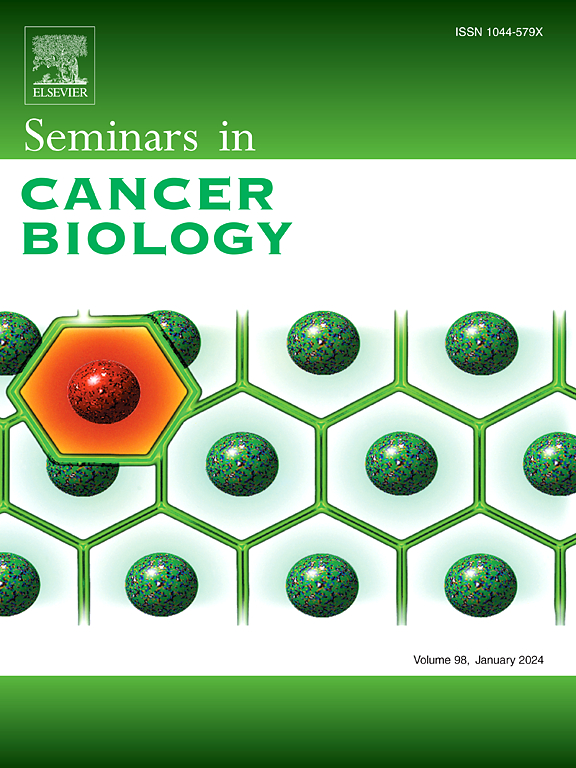Extracellular vesicles and the lipid messengers: The adipose tissue connection to cancer and metabolic disease.
IF 15.7
1区 医学
Q1 ONCOLOGY
引用次数: 0
Abstract
Adipose tissue is essential for maintaining metabolic balance by serving as a major lipid depot for energy storage and release, while also secreting adipokines and extracellular vesicles that regulate inflammation and insulin sensitivity. The lipidic content of adipose tissue not only supports energy homeostasis but also contributes to its inflammatory profile, with altered lipid composition being a key factor in the pathogenesis of metabolic diseases such as obesity, type 2 diabetes, and cardiovascular disorders. Moreover, adipose tissue-derived extracellular vesicles, enriched in lipids, have emerged as significant mediators of intercellular communication, influencing local and systemic processes, including tumor progression. Adipose tissue-derived extracellular vesicles (EVs) have emerged as pivotal mediators of intercellular communication, with increasing evidences describing their role in microenvironment communication. In this review, we explore the diverse lipid species identified within EVs and examine lipidomics as a powerful and emerging technique to decode their functional roles. By analyzing the lipid cargo of these vesicles, we highlight their potential influence on cancer progression and cardiovascular disease. Furthermore, we discuss the broader implications of EV-derived lipids in metabolic regulation and disease pathophysiology. Understanding the complex interplay between EV lipid composition and pathological processes could open new avenues for biomarker discovery and therapeutic interventions in oncology and cardiovascular medicine.
细胞外囊泡和脂质信使:脂肪组织与癌症和代谢疾病的联系。
脂肪组织是维持代谢平衡所必需的,作为能量储存和释放的主要脂质仓库,同时也分泌脂肪因子和调节炎症和胰岛素敏感性的细胞外囊泡。脂肪组织的脂质含量不仅支持能量稳态,而且有助于其炎症谱,脂质组成的改变是代谢性疾病(如肥胖、2型糖尿病和心血管疾病)发病的关键因素。此外,脂肪组织来源的细胞外囊泡富含脂质,已成为细胞间通讯的重要介质,影响局部和全身过程,包括肿瘤进展。脂肪组织来源的细胞外囊泡(EVs)已成为细胞间通讯的关键介质,越来越多的证据描述了它们在微环境通讯中的作用。在这篇综述中,我们探讨了在ev中发现的多种脂质物种,并研究了脂质组学作为一种强大的新兴技术来解码它们的功能作用。通过分析这些囊泡的脂质货物,我们强调了它们对癌症进展和心血管疾病的潜在影响。此外,我们还讨论了ev衍生的脂质在代谢调节和疾病病理生理学中的广泛意义。了解EV脂质组成与病理过程之间的复杂相互作用可以为肿瘤和心血管医学的生物标志物发现和治疗干预开辟新的途径。
本文章由计算机程序翻译,如有差异,请以英文原文为准。
求助全文
约1分钟内获得全文
求助全文
来源期刊

Seminars in cancer biology
医学-肿瘤学
CiteScore
26.80
自引率
4.10%
发文量
347
审稿时长
15.1 weeks
期刊介绍:
Seminars in Cancer Biology (YSCBI) is a specialized review journal that focuses on the field of molecular oncology. Its primary objective is to keep scientists up-to-date with the latest developments in this field.
The journal adopts a thematic approach, dedicating each issue to an important topic of interest to cancer biologists. These topics cover a range of research areas, including the underlying genetic and molecular causes of cellular transformation and cancer, as well as the molecular basis of potential therapies.
To ensure the highest quality and expertise, every issue is supervised by a guest editor or editors who are internationally recognized experts in the respective field. Each issue features approximately eight to twelve authoritative invited reviews that cover various aspects of the chosen subject area.
The ultimate goal of each issue of YSCBI is to offer a cohesive, easily comprehensible, and engaging overview of the selected topic. The journal strives to provide scientists with a coordinated and lively examination of the latest developments in the field of molecular oncology.
 求助内容:
求助内容: 应助结果提醒方式:
应助结果提醒方式:


